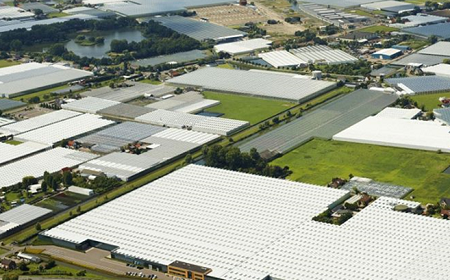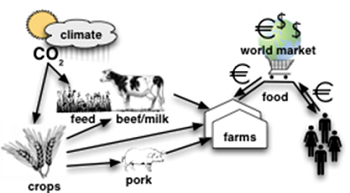MACSUR
Modelling European Agriculture with Climate Change for Food Security

“The MACSUR project is a joint project with a difference. As a knowledge hub it is working on Modelling European Agriculture with Climate Change for Food Security. It was set up as a single project, thereby not competing with other players in the field, as is often the case in other joint programmes”, according to Floor Brouwer of LEI Wageningen University & Research. Together with Dr. Franz Sinabell from Austria he leads the theme of Economic and Trade Modelling (TradeM) within MACSUR.
The MACSUR project was set up to bring together the broad expertise and knowledge on modelling, models and tools. This is the building block to address the overarching challenge to develop a pan-European capability in the development, use and interpretation of models to perform risk assessments of the impacts of climate change on European agriculture and global food security. Parallels can be found in the broad expertise and knowledge base of Wageningen UR. This results in Wageningen UR being very active in all three themes; by co-leading the Livestock Modelling (LiveM) and Economic and Trade Modelling (TradeM), and responsibility for the several work packages in the Crop Modelling (CropM). This makes it also in keeping with the drive Wageningen UR has to improve quality of life.
“Combining the (restricted) budgets from the 71 organizations, each through their own national funding agencies, together with new money in the frame from JPI-FACCE, gives the (financial) opportunity to this broad scope, corporation, networking and knowledge development. The set-up for this concerted action gives financial leverage’, according to Floor Brouwer. ‘And the consortium has the ambition to work together for a long time on the interoperability of models”.
Outcomes and dissemination
The results are disseminated through annual science conferences. This gives researchers great opportunities to publish their findings, and to interact with a large group of experts in Europe. The international cooperation and networking is found to be greatly increased within the project, and subsequently researchers can find each other more easily outside of the project, e.g., in other concerted actions. In this project opportunity is given to young researchers, for taking part in this international research.
Workshop
Upcoming is the TradeM International Workshop in Norway at the end of November. Where the perspectives of integrated assessment approaches are discussed, as well as applied crop, livestock and economic models studied and assessed, international collaboration fostered, and to plan and identify next steps to achieve TradeM contributions to MACSUR goals.
Special issue
Recently, the German Journal of Agricultural Economics (GJAE) published a special issue on “The Economics of European Agriculture under Conditions of Climate Change”. MACSUR contributed to the article on the understanding of recent developments related to agriculture and climate change in four European countries, thereby focussing on quantitative modelling and empirical analyses.
About MACSUR
MACSUR is a knowledge hub; a new innovative tailor-made instrument developed by FACCE-JPI (Joint Programming Initiative for Agriculture, Climate Change, and Food Security). MACSUR gathers the excellence of existing research in livestock, crop, and trade science to describe how climate variability and change will affect regional farming systems and food production in Europe in the near and the far future and the associated risks and opportunities for European food security.

Through MACSUR, Europe is cooperating with other international research networks like AgMIP, taking the models to a worldwide scale. The knowledge hub consists of 71 organizations from 17 European countries plus Israel. The overarching challenge is to develop a pan-European capability in the development, use and interpretation of models to perform risk assessments of the impacts of climate change on European agriculture. The project focusses on the technical and informational integration of suitable existing models and their application in regional case studies that reflect the European diversity in soil, climate, socio-economy and agricultural systems.
Researchers in the spotlight with projects funded through jointly programmed calls
One of the aims of joint programming is aligning research & research funding and this usually results in a joint call to which proposals can be submitted. In a series of interviews, researchers from Wageningen University and Research present their granted projects from such joint calls.
